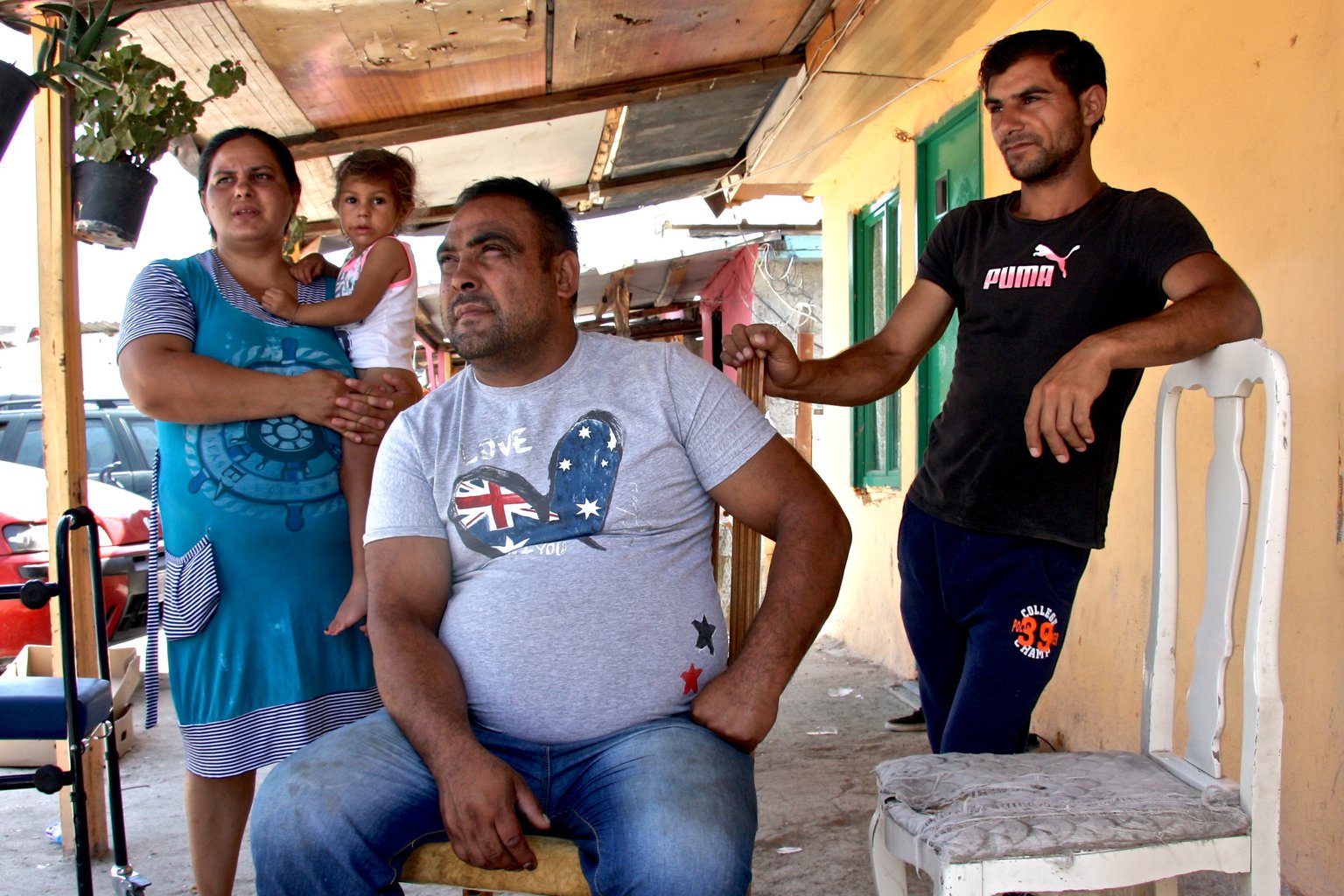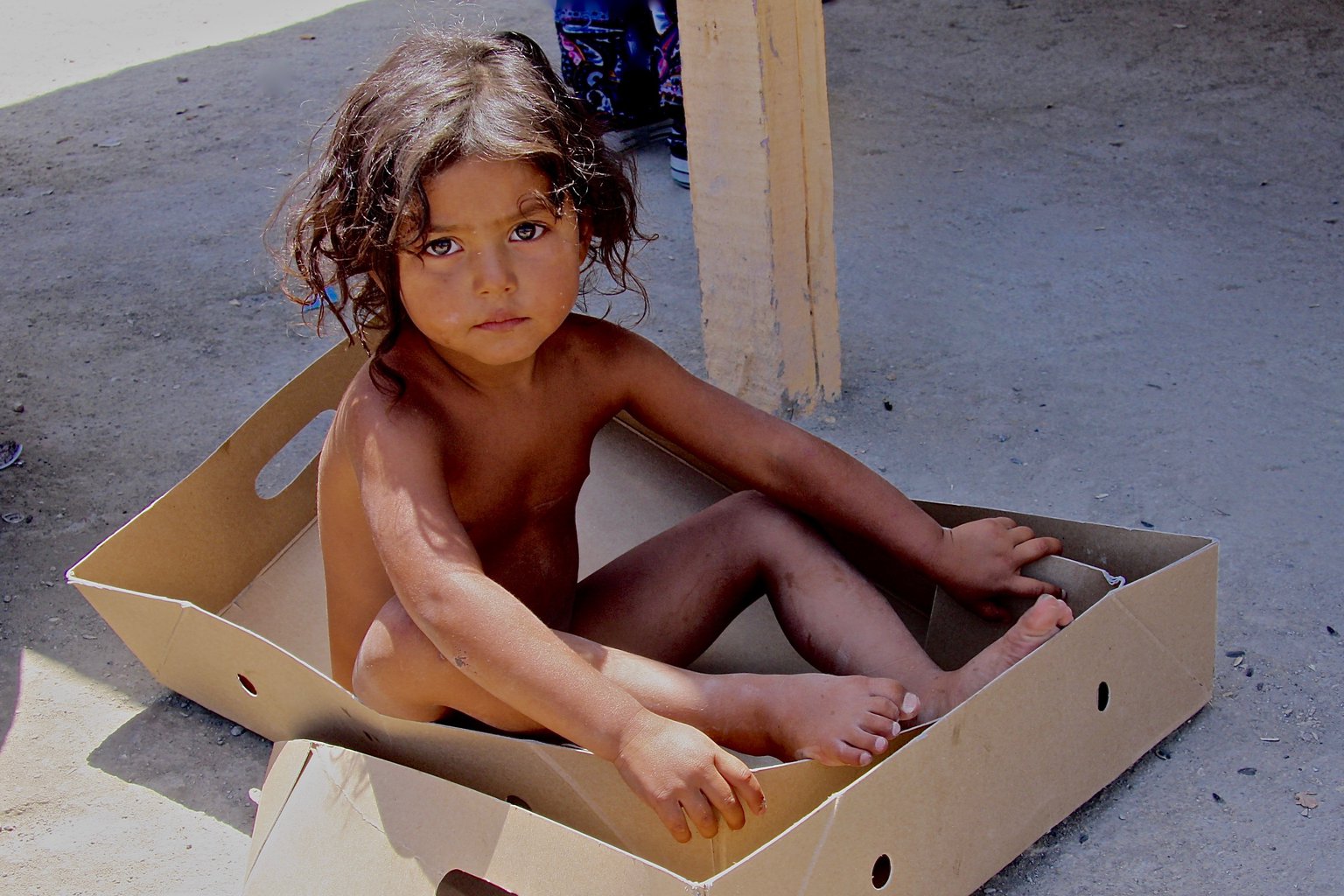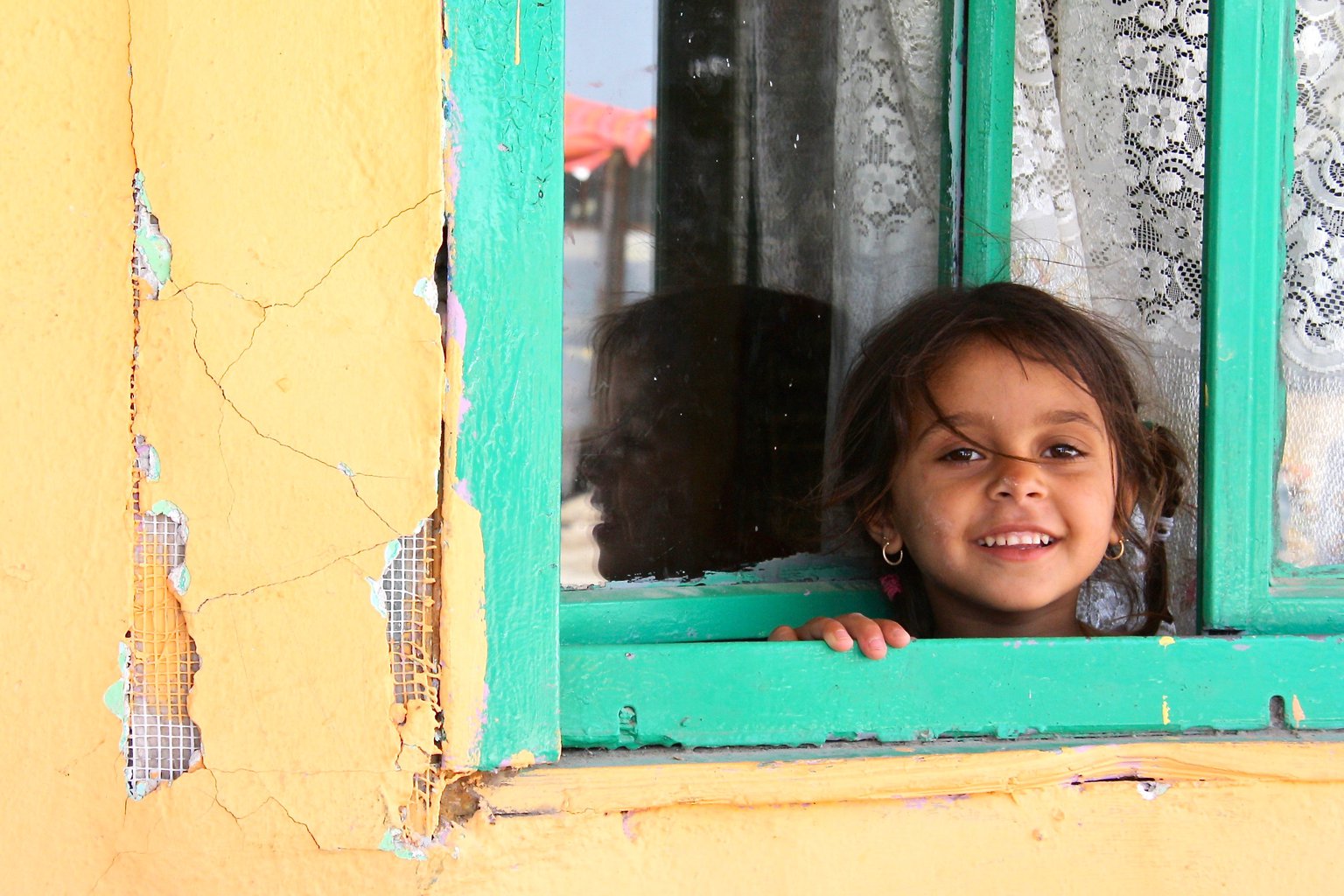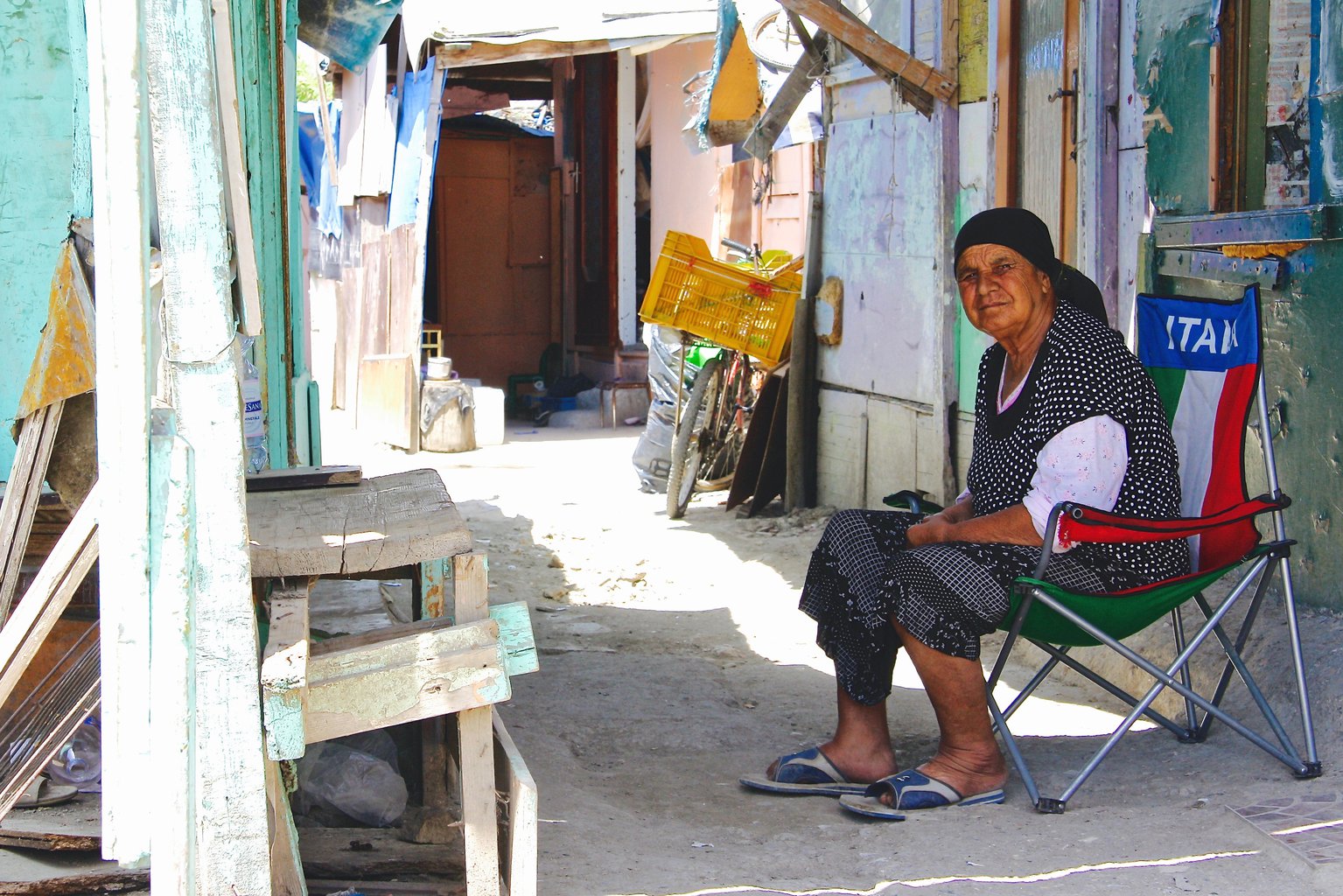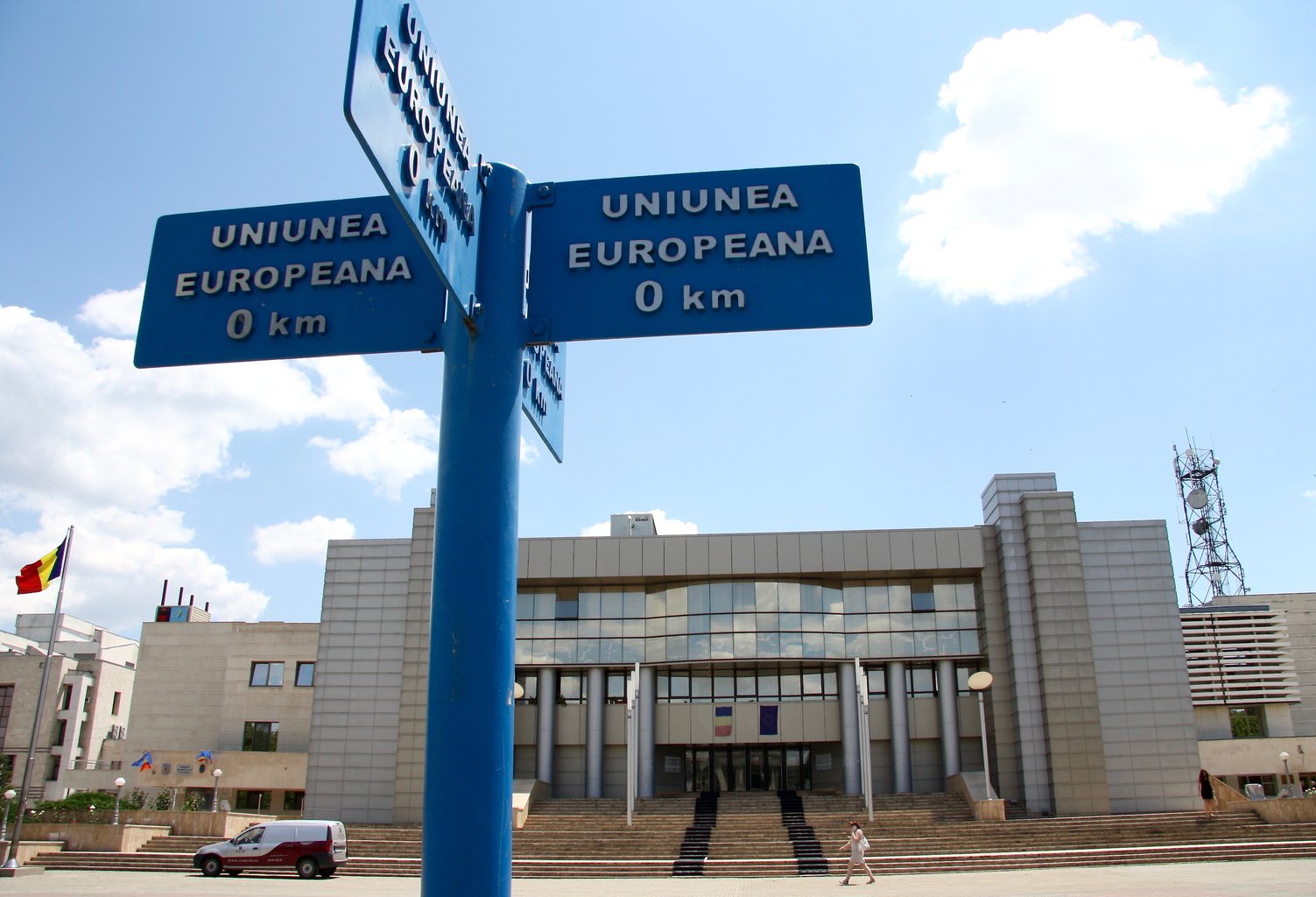The Neapolitan Exodus
Between a warehouse and an empty factory and spread across a parking lot, the favela of Gianturco in Naples resembles a village constructed in an afternoon.
Hundreds of tiny shanty-huts are jumbled on this field of gravel, each with a number painted in blue on the plastered walls and topped by electric wires and satellite dishes. It lies in the shadow of the skyscrapers of the Naples business centre, the administrative heart of southern Italy.
Families of geese saunter in lines across the car park, picking out specks of food from between the concrete.
A short man in his forties with crooked teeth pats his belly and shouts at us.
“For New Year’s Eve,” he says, “Buf! Mangiare!” Chop! Chop! We will eat them!
“We’ll keep some geese for the next year as well! We also had pigs, and they grew up very well, because we were feeding them bread and everything! We will also eat them on New Year’s Eve. Because, after all, we are humans.”
The houses are improvised from plywood and plastic. Some use commercials from giant hoardings as a roof. Tyres, bricks and pieces of concrete are laid on top of the adverts, to keep them in place. A bar is open. Serving beer and coffee.
Where are you from? We ask the man with crooked teeth.
“Calarasi,” says the man.
All of you?
He speaks in Romanian.
“Toti din Calarasi!”
All are from Calarasi.
An industrial town of 65,000 near the Danube with a steel-pipe factory, Calarasi has seen over 5,000 Romanians migrate to Naples in the last two decades.
In the shanty village, plump women in their 40s and 50s and thin men with grey stubble and hard faces, worn by decades of working in the sun on Romanian field, wheel along the dirt shopping trolleys of scrap metal and used electronics.
It is the end of July. The wedding season in Romania started. Many from the camp have left for Calarasi to celebrate.
We have heard that a Chinese company has bought the land of Gianturco. The camp is facing an eviction order from the cops. 1,500 families could risk being placed on the streets. The authorities only have new residence for 180 people.
Romanians moved here three years ago, says a woman in her forties, nervously eating sunflower seeds and spitting out the shells. They noticed the empty plot in a former tyre warehouse, and piled in.
“All of us entered here in a single day,” she adds.
Nobody told them to leave, so they started building houses from bricks and breeze blocks.
“How could we afford 350 Euro per month for rent in the city?” says an older man. “Where else should we go? Into the city, to get beaten up by drug addicts?”
Roma are “nomads”, so they “must live in camps”
There are around 20,000 'homeless' living in shanty-hut villages in or around major Italian cities such as Rome, Naples, Milan, Turin and Venice.
In Rome there are 8,000 and in Naples 3,000, according to ‘21 July’ a Rome-based association which promotes the rights of Roma in Italy. Although few living in these favelas were born in Italy, about half have Italian citizenship.
Most residents are from the Balkans: Romanians, Bosnian, Serbian, Macedonian and Kosovars.
Nearly all are Roma. Those from the ex-Yugoslavia were asylum seekers during the war in the 1990s. While waiting for a decision on whether they could receive international protection, the Italian authorities placed them in refugee camps.
“We [Italians] decided that Roma were nomads and a good solution for them is to stay in a camp,” says Aurora Sordini, a board member at ‘21 July’.
Even though all these people lived in houses or in Communist blocks in their home countries - in Italy they were ‘gypsies’, so they were ‘nomads’, so they ‘lived in camps’.
“It’s an old-fashioned idea,” says Andrea Belfiore, a mediator from Emergency, an association providing medical services to the camps.
But he adds that another strategy of the authorities is to concentrate the new residents in one location. “It’s to control them,” he says.
Beginning in the early 2000s, Romanians settled in the camps with the ex-Yugoslavs, while others built similar ones on former industrial platforms. But the Romanians were not refugees. They were economic migrants.
Finding a job was hard for the residents of a shanty village. They had no permanent address. No legal status. Employers would not take them seriously.
They turned to cash-in-hand jobs, collecting and selling old iron, aluminium or plastic from rubbish tips. They picked fruit in the summer. Some boys and girls turned to prostitution.
“We also work as day laborers, cleaning staircases and things like that for 30 or 40 Euro a day,” one woman in Gianturco tells us.
Some from the camps would beg and others would steal - copper was the target. This could be torn down from railway infrastructure, even from hospitals. Copper itself could be stolen from gravestones in cemeteries. This delayed the trains, stopped medical care in hospitals, was seen as desecration.
“These are petty crimes, but there are lots of them and they are very visible,” says Vincenzo Nicoli, chief of the Second Division of the Central Operational Service (SCO), Italian Police, “and such gestures are irritating for the local Italians.”
These Romanians became a target of contempt from Italians. And the press reflected this. Integration became even harder to achieve.
“All we ask for: a road and schools”
Around Naples are four major camps. Three are inhabited by Romanians, the fourth by Serbians and Bosnians. In August, Gianturco and another, Ponticelli, were threatened with destruction.
Another camp, Barra, is ‘semi-recognized’ by the local authorities. In July the grass is high in the empty lots around the motorway flyovers. We turn off the main street and onto a gravel road.
A woman in her seventies sits on a deckchair decorated with the Italian flag. Fish are hanging from a wire, drying in the summer sun. Naked children are playing in the dust. Cars are rusting with rugs across their roofs.
We talk to Nita. Heavy-built, in his early 40s, he wears a t-shirt of a heart with the Australian flag inside. Above is printed the word ‘Love’ and below ‘Me + You’.
We ask where he’s from.
“Calarasi,” says Nita.
“All of you?”
“Toti din Calarasi.”
All are from Calarasi.
Around 80 to 90 families live here. Nita arrived here in 2003 from Calarasi. He knew no one in Naples, but took the risk.
“Each of us built his own house,” he says.
No one in Italy wants to hire him and his family, so they live from collecting and selling old metal. “We get five to ten Eurocents per kilo. In a week you can fill a small car. I get 20 Euro for it.”
Begging is another source of income, but Nita - who has five children - says this is risky. “If you take the kid begging in summer, they [the police] would say it’s too hot [to be out with the child],” he says. “If you do the same in winter, they will say that it’s too stormy.”
That morning a Bulgarian Roma turned up with a bag of fish for Nita’s family. For him, food is the ultimate proof of kindness. “Good people will offer you food,” he says.
Nita wants the authorities to provide him with two improvements: a decent access road and more help for the children in Barra. At this moment, about 100 camp children go to Italian school.
“I hope they will be smarter than us and that they will have jobs and do what we weren’t capable of doing,” he says.
Roma from these shanty-towns are often kept out of medical care. The need for such services is huge. Around 95 per cent don’t have the necessary legal documents, so have access to only basic health support.
“They do not have the right to apply for a pediatrician, so there is no support for the children,” says Andrea from Emergency.
Although vaccination is free of charge, many Roma families don’t have the medical historical documents for the children with them in Italy, so the NGO doesn’t know whether they were immunized in Romania.
“I told you - all is well”
We travel with Andrea to Ponticelli. This is a camp near a disused factory. Here Emergency is helping a man who recently suffered a leg amputation. At the entrance are huge piles of trash.
The houses are improvised from broken pieces of furniture and doors. Some of the residents are outside - sunbathing on sofas.
Kids are playing pool on a table under a tree. But the table has no pockets. So when they hit the balls, they fall through the holes and onto the ground. Rather than put the balls back on the table, the kids lay down on the gravel with their cues, and hit the balls across the dirt.
A thin man in an open shirt and shorts walks up to us.
We ask where he is from.
“Calarasi,” says the man.
“All of you?”
“Toti din Calarasi!”
How do you like it here? Any problems?
“Everything is fine here,” he says. “You can leave.”
But we want to talk to you about the camp.
“There’s nothing to say, everything is fine. You can leave.”
We want to know about what life is like here for Romanians in Italy.
“I told you - all is well.”
At the side of the camp we notice a wall made of broken doors, table tops and old furniture. It runs for about 100 metres. On the other side is another camp.
Here the buildings raised off the ground by stilts.
A woman in her fifties in a headscarf talks to us. She is concerned about her son. He finds it hard to get a job and to get on with Italians in the city. She is worried that he does not know the language. Andrea tells her again, what he has told her before, that her son needs psychological, not medical care.
We ask her why there is a wall.
“The people here are from [the northern Romanian city] Cluj,” she says, gesturing down, and then over the wall, “and the ones over there are from Calarasi.”
She says the kids from one camp used to argue with the others - so they built a wall.
“It’s better this way,” she says.
But what happened?
She smiles.
“It’s better this way.”
The woman works on the beach selling cigarette lighters. She used to beg, she says, but not now.
She shows us her house. One room raised on stilts. Inside is a bed and a giant fridge-freezer. She is proud of this massive appliance, and opens the door to let us see inside. In the freezer section there are piles of plates. On the shelves of the fridges are packets of food. There is no electricity.
“I don’t cool them,” she says. “It’s to keep them away from the rats.”
Outside there is a child playing with a water hose. She is wondering why the water is not coming straight out from the spout.
Then she realises there is a hole in the hose, and the water is leaking. She puts her trainer on the hole. It stops. She takes away her foot. The water rushes out in a surge and soaks her trainers. If she puts her trainer on the hole for a longer time, the water pressure builds and a larger spray comes out.
She jumps through the spray. All her clothes dampen. Then she puts her head on the jet of water, and washes her hair, laughing at the same time.
Fewer than three months after we visited Ponticelli, the camp of Cluj residents, the one of those from Calarasi, and the wall separating the two, were all destroyed by the city of Naples.
Some residents moved to other camps, others went back to Romania.
“Everyone is a mayor in the camp”
49 year-old Elena sits in a chair in the middle of her one-room home at the edge of Naples. Her bed to the left. A cabinet in front, and a sink and cooker behind. Every time she makes a small movement - a hand gesture, the turning of her head - she winces in pain. Outside a horse neighs. She lives in a shed near a horse-breeding farm.
A younger woman brings her a phone, announcing her that “it has started”. From the speaker on her telephone plays the music of a church service. The hypnotic tones of a capella voices in an Orthodox liturgy. Taking place 1,000 kilometres away in Calarasi.
Two days before, Elena’s mother-in-law died. But she could not take the plane from Naples to Romania for the funeral. She is sick with rheumatism.
“Everybody told me: ‘Why don’t you go there, because you won’t see her again?’” she says. Instead, she attends the funeral by cellphone.
In 2006, Elena first came to Italy, to see “how it works”.
For 18 years in Romania, Elena had jobs in customs and as a waitress in Pescaru Restaurant opposite the Intercontinental Hotel in central Bucharest. She got married - and divorced - but had a whim, to go to Italy.
“This whim cost me everything,” she says.
She had some nephews in Italy, in Villa Literno, a few kilometers from Naples.
“My sister’s son told me: ‘This life in Italy is not for you, you won’t resist it here.’
‘I will make it!’ I told him. I can do anything. There’s no ‘I can’t’. That was my slogan.”
Elena landed a job picking strawberries. But when she entered the field, bending down, keeping an arched back, she could not do it. After that, she cleaned out stables with her husband, but they lost the job. She went back to Calarasi, but couldn’t find work.
She had no money and no place to go. Her second husband knew some Roma, so they went to live in a settlement camp. The chief of the favela, Mario, promised the couple ‘milk and honey’.
But they were paying 150 Euro per month for a shack, plus an extra 17 Euro for electricity. “Some people would pay 12 Euro, others nine, depending on the weakness of that person,” she says.
Most of the people were Roma from Calarasi. The owner would pocket the ‘rent’ and ‘services’. He opened a bar, where he would sell contraband cigarettes for double the price. There he would offer Cognac bought for five Euro from a hypermarket for 15 Euro a bottle. A jar of cucumbers for 89 cents, he would sell for 2.5 Euro.
“Sometimes you were pressured to buy, because you would buy on credit,” she says. “But that does not mean that they should rip the skin from our flesh.”
But when the police arrive - even two or three times a day - the camp boss disappears, says Elena. He closes the bar and hides in his house. “He's the head of the camp only when the police are not there,” she adds.
When we spoke to residents, they denied that any power structures existed in the camps.
“No one is a boss here,” Nita told us about Barra.
When we pushed some men sitting astride a car in Gianturco, they told us the same - in an aggressive tone.
“Everyone is a mayor in the camp.”
Inside the camp where she stayed, Elena says the people lived from theft and prostitution. They used to collect scrap metal, but not so often anymore.
“They would send their wives to beg and pickpocket,” she says. “They would steal phones. Many of them would come to me to try and sell me one. Others would sleep during the day and they would go and take apart the machines and fittings in factories at night, and steal copper wires.”
Elena says they come from Calarasi to Naples “because they find what they want here. They are accepted, they are allowed to steal, it’s favorable for them. If they go elsewhere, they are considered gypsies.”
The camps are perceived by Italians as a source of crime. In Barra, if anyone is caught thieving, Nita says he will be forced to leave the camp.
“We don’t need thieves,” he says, “we only need people who are kind and who work.”
Pushed on how many people he has expelled, Nita says there was no one.
Some camps have more people in jail than others. The crimes are usually small thefts and robbery with one or two year sentences. In Naples, organised crime among the Roma is non-existent, because they would have to come up against the mafia clan, the Camorra.
More of these criminals are now under house arrest. For the judge to sentence home detention, the accused needs to have a rental contract or a property deed.
So the convicts have to sign in at police station, or the police will come to the camp.
“It is strange that the authorities do not recognise the Roma camp as a legal residency, but at the same time allow people there to be under house arrest,” says Belfiore. “So when it is convenient for state, the camp is legal.”
Asked about how this irony can exist, police chief Vincenzo Nicoli argues: “House arrest means remaining in a place where the prisoner is traceable, it is not necessarily their residence.”
“Better before the Revolution”
Calarasi is a typical southern Romanian town.
It has a giant new and expensive civic centre made of glass and steel and sparkling bronze statues of Romanian rulers in its parks - in this case, World War Two leader King Mihai, who is still alive.
Its central streets are clean, and there are lines of shabby shops selling second hand clothes from the UK and Germany.
A taxi driver tells us “everything was better under Communism. We had jobs. We had education.”
He is not the only person in town with this opinion.
Niculae Pitigoi is one of the two municipal responsible for the relationship with the Roma community in Calarasi.
That August morning we stop him on the way to an important rendezvous. He needs to visit a family organising a wedding this week and tell them to keep the music down and prevent the guests from occupying the street, otherwise they will face a fine.
Pitigoi has a notebook where he lists all the weddings planned for 2016, divided by dates. For each of them, he writes a name and a contact number. He calls and tell them nicely to lower the noise. To make sure that the message gets through, he visits each of them.
“They created a discomfort in Calarasi,” says Daniel Stancu, the other municipal worker responsible for the Roma. “There are two months with weddings every day. People started calling the emergency services and asking: 'What will you do about them? They bother us every night’'.
In recent years, spectacular Roma weddings in places such as Calarasi have dazzled the international press: the bride is flown in by helicopter, or the groom turns up in a limousine, the Manelisti (singers) are brought in at prices in the tens of thousands of Euros.
“Our predecessors didn't do such weddings,” says Stancu.
In the early '90s, Calarasi’s huge steel factory which hired around 1,500 people, was dismantled, and people couldn't find other jobs. They began to travel to Italy. When they came back, Pițigoi says: “They wanted to show that they did something with their lives”. This would mean a wedding, or a car, or a house.
But there is poverty in Calarasi. High unemployment. A low level of literacy. One important task for the town’s Roma office is to help people who don't know how to write, so they cannot take care of documents to receive assistance.
“There are people getting sick who don't have money for a prescription and people who are not even paid the minimum wage,” says Pițigoi.
For him, it was better before the Revolution in 1989, as everyone had jobs, and the Romanians and Roma worked together, they got to know each other, and the level of discrimination and the crime rate were lower. He finished high school in 1980 and was hired immediately after. He remembers his first job - where he became 'employee number 1114'.
“Communism was the best time [for the Roma], because they were obliged to get a job and go to school. (...) If a Romanian worked and sat down to eat with a Roma, he wouldn't call him 'gypsy' anymore, he would call him by his name.”
There is now a generation of Romanian Roma who have grown up in Italy and speak better Italian than Romanian. Their country is only a place to visit in August - the wedding season.
“You cannot live in Romania,” says 20 year-old Andrei, a Roma resident in Rome. “You can only work in a field and grow some potatoes and onions, but you cannot make money, you cannot raise a child there.”
When we ask all the residents of the shanty-huts if they will go back, we hear the same refrain:
“What is there for me to do in Romania?”
The quality of life is higher in Italy than in Romania - even for those living in favelas and at risk of eviction. For Nita, Italy is much cheaper. With ten Euro he can buy food for the entire family. In Romania, this is not possible.
None of them feel they have opportunities, and the older ones believe the collapse began after Communism fell.
They are nostalgic for the dictator Ceausescu on the other hand, and hopeful about western Europe on the other. But as for their own country today, they have only indifference.
No one wants to go home there. It is more common for us to meet people who have left Italy to work in Spain or the UK. Most recently there is a wave of Italian-Romanians moving to Los Angeles.
The mayor of Calarasi, Daniel Dragulin, believes more help is needed to improve the situation of Roma from Calarasi. He argues that the situation can be solved only at its source: “I said [to the Italians] 'Help us. Invest in Calarasi,’ which has a massive community in Naples. Instead of spending money with no results [in Italy], support us here.”
Since this appeal, little has happened. The two worlds are still separate.
Back in the balmy August afternoon in Naples in the camp of Barra, the fish from the Bulgarians is on the grill. Naked children are still playing in the dust.
There is no talk of returning home.
“Ceausescu used to give you a job,” says Nita’s wife, Sanda. “There were crops, gardens, in Calarasi there was the steel plant, and everybody was working. Now it’s all dissolved. The plant is closed. The fields are empty. Calarasi has been bought by the Chinese and the Italians. We stay here because we have nowhere else to go.”
Part of The Black Sea Eurocrimes project financed by Journalism Fund
Follow us
